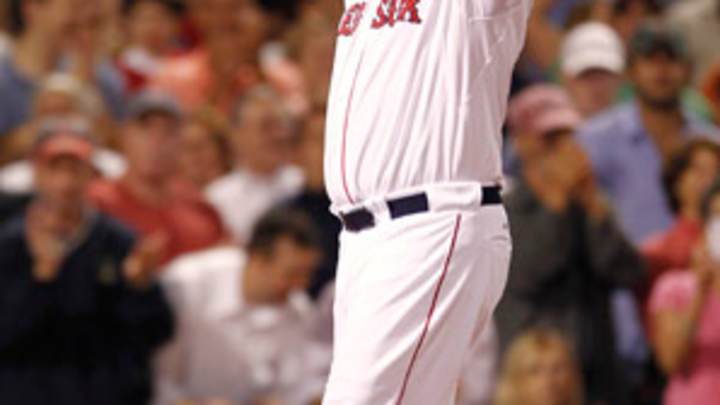Sports gods are omnipresent to many, even though they don't exist


On Sunday J.J. Henry led the Byron Nelson Championship by a stroke on 17, at which time he hit his tee shot six yards over the green, double-bogeyed the hole, finished tied for third and told the press, "I thought I hit a good shot but the golf gods thought otherwise." And with that, responsibility lay not with Henry, nor even a single supernatural force -- a soft-spiked, hard-hearted golf god -- but with a whole panel of multiple gods subjectively critiquing his performance, like the judges on American Idol.
An idol is a false god, and sports are overrun with these malevolent beings. Not the idolized athletes, but the dubious gods who look down on games from arena catwalks and ballpark floodlights and the TV towers near golf greens, the gods who determine -- based on little more than a whim -- which team will win and which team will lose. They're like David Stern but not as fearsome.
Imagine the God on the ceiling of the Sistine Chapel, his right index finger reaching out to Adam, only that index finger is an oversized foam finger, and the Adam in question is Adam Henrique of the New Jersey Devils. Those Devils beat the Rangers on Monday night, behind two goals from captain Zach Parise, who said afterward: "I think the hockey gods were on our side tonight."
If gods and Devils seem like strange bedfellows, they're not in sports, where gods and devils are indistinguishable. Frequently vengeful, always partisan, sports gods taketh away while forgetting to giveth, or giveth while neglecting to taketh away. During the Celtics-Sixers game Monday night, Dick Stockton and Chris Webber talked about the resident "leprechauns" at TD Garden -- they relocated from the old Boston Garden, evidently -- as if the Celtics really did employ a small staff of lucky charms who subsist primarily on Lucky Charms.
The morning after that game, I woke to this tweet from the sportscaster Len Berman: "The baseball Gods are laughing. Top 4 payrolls all in last place. Yankees/Red Sox tied for last, Phillies and Angels also in basement."
This was a welcome departure for the baseball gods, who historically looked with frontrunning favor on the Yankees. It's why Washington Senators fan Joe Boyd had to sell his soul to the Devil for his team to have any hope of beating the damn Yanks in Damn Yankees -- because the Yankees were already backed by multiple gods, if not God Himself. In 1926, a United Press correspondent put it this way, while writing from -- where else? -- the World Series: "The Yanks players admitted that the baseball gods, if there are any ... gave them the fifth game of the series in St. Louis yesterday."
That sentence doesn't merely highlight the century-old relationship between the Yankees and the gods, but also reveals a rare instance of agnosticism: If there are any?
It's the most fundamental question in sports theology: Do you believe in gods? Not God, with a capital G and a long white beard, but gods, with an s, smiling on us, laughing at us, mocking us, quick to anger and loath to let that tree kick your tee shot back into the fairway.
The answer, according to even the most cursory review of the literature, is Yes: We do believe in sports gods, even as we dislike them intensely. I will probably be punished for saying so, but they are lazy, constantly in arrears, owing us favors but seldom repaying them -- or repaying them so late that we resent their very repayment.
And they've always been that way. "The basketball gods owed us one," Oral Roberts coach Scott Sutton said last season, after his team beat Arkansas-Little Rock. "The hockey gods owed us one," the Bruins' Glen Metropolit said after scoring against the Canadiens in the 2008 playoffs. "I felt the golf gods owed me one," Ernie Els said in 1997 at the World Championship of Golf. "The football gods owed us that one," George Seifert said in 1995 after his Niners beat the Rams. And on and on and on they go, back to the beginning of the 20th century.
These are deadbeat gods, avoiding the phone when the cosmic collection agency comes calling, living under any number of assumed names. Sometimes the gods are called fate, sometimes luck, sometimes leprechauns. When Chelsea beat Bayern Munich in the Champions League final on penalties last Saturday -- after losing the 2008 final to Manchester United on penalties -- the team was said to have "vanquished ghosts" (Reuters) and "exorcised ghosts" (ESPN, The Guardian), thanks in part to goalkeeper Petr Cech, who was "not haunted by [the] ghosts" of four years earlier (Express).
If all this sounds implausible -- ghosts, gods and devils, intervening in sports -- bear in mind: As of this morning, the Yankees were a game out of last place, and the baseball team in Washington was in first.
